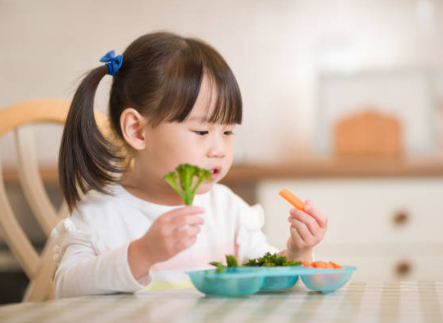Imagine the picture… Your baby sits in a high chair, grimaces at the vegetables, and yells, “Disgusting! And throw broccoli in your face. Feeding small children is not easy, and it can make you feel like a failure. However, with a few tips, you can feel confident in your approach to dietary parenting. Plus, you can help your child learn to love vegetables!

How to Get Your Child to Eat Vegetables
There are a few basic things you can do to get your child to eat vegetables. The key is to make it fun to make them eat (not a chore). Luckily, with three important parenting meal tips, it should be a lot easier to get your child to try and enjoy some of the veggies on the plate.
- Expose your child to different vegetables
- Adopt a stress-free, laid-back attitude, not bribes or ultimatums
- Encourage your child to eat colorful foods and play with food!
Let’s dive into these…
Expose Them to Vegetables
The quickest way to get babies and toddlers to eat vegetables is to provide them. A lot. Serve them as much as you can! I even serve them for breakfast and snacks. A pea on the snack plate is the equivalent of an exposure victory for you, the parent!
The more vegetables children see, the more likely they are to touch them. Touches produce odors. The smell causes licking. Licking brings the taste. Taste leads to chewing. Chewing leads to swallowing…
I have a little guy who is nervous about new foods, but I keep putting him in touch. Last summer, when he declared “Love!! , he scored a major victory. Tomato. (After 3.5 years of exposure!) Such a big win takes time, and while he’s eaten other veggies he’s always loved, some of them are already acquired!
Giving children the time and space to learn Xi love food can give them lifelong enjoyment of food and confidence in their diet.
Parenting Tips:
Start when your child is a baby and expose your child to as many different types of vegetables as possible. Make sure they are safely prepared (keep hard raw vegetables for later use) and always include them. Even if the baby or child rejects them, continue to serve in a stress-free way…. Think about the long-term game!
A “Stress-Free” Approach to Feeding Your Child
If you’re looking for the best way to help the little ones really enjoy the food they eat, try the “stress-free” feeding method.
As a parent, it is your responsibility to provide three things:
- Nutritionally balanced meals with at least 1 food your child enjoys at every meal and snack
- Meals and snacks are routine
- A safe place to eat without interruptions

It is your child’s responsibility to decide:
- Whether to eat or not
- How much to eat
This means that when you expose your child to new foods, you can let them decide whether or not to eat them. You also allow them to decide how much to eat.
The great thing about “stress-free” is that it also ends the food war. When your child says they don’t like a certain food, you can remind them that they don’t have to eat it. They can dine with you at the table (if you have an active toddler, the meal time will be short) and go downstairs. Once the eating pressure of the little ones is gone, they usually have the courage to learn Xi like new foods!
Studies have shown that babies and toddlers are very good at listening to their own bodies. If you give them nutritional options and structure, they’ll eat what they need during the week. If toddlers eat a lot today and “air” tomorrow, that’s okay. This is normal behavior for young children! Of course, if you have questions about your child’s growth, development, or eating patterns, it’s wise to call your pediatrician.
Parenting Tips:
Accept your role as a provider of food and structure. Give your child space to decide whether and how much to eat.
Encourage Your Child to Play with Food
Finally, encourage your child to explore their food. Give them new textures, different utensils, and play some small food games.
For fussy toddlers, sometimes you just need a new appliance to help them bite. For older kids, toothpicks are absolutely magical! Even babies love forks and spoons, learn Xi what they are used for and how to use them.
Stupidity also pays off greatly. If it makes your child smile, you know you’re on the right path. Play can help your child learn to like foreign food and associate it with positive situations.
Parenting Tips:
Call your broccoli “little tree,” pretend everyone is a bunny, think about carrots, ask your kids to give vegetables a funny name, or take some silly vegetable selfies.
Regardless of how you’re feeding right now, remember you’re doing a great job! Every exposure is a point for you and a step in the right direction. Before you know it, your child will also eat broccoli.

